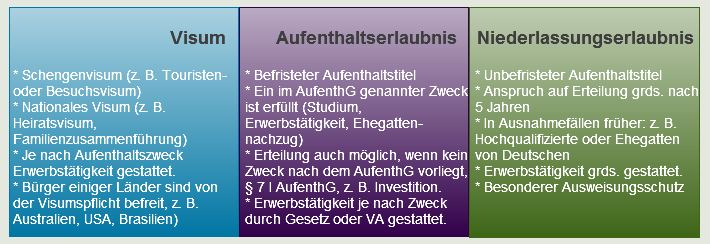Administrative Court of Karlsruhe, Decision of 23 January 2012, 6 K 6/12
The independent right of residence for spouses is regulated in § 31 of the German Residence Act (AufenthG).
According to § 31 para. 1 AufenthG, the residence permit of a spouse is extended as an independent right of residence, separate from the purpose of family reunification, for one year if the marital cohabitation has been legally maintained in Germany for at least three years, or if the foreign spouse has died while the marital cohabitation existed in Germany, and if the foreign spouse held a residence permit, a settlement permit, or an EU long-term residence permit at that time, unless the extension could not be applied for in time for reasons beyond their control.
-
-
- 1. the marital partnership has legally existed in the federal territory for at least 3 years or
- 2. the foreigner died while the marital partnership existed in the federal territory
-
and the foreigner was previously in possession of a residence permit, settlement permit or EC permanent residence permit, unless he/she was unable to apply for the extension in good time for reasons for which he/she is not responsible.
According to § 31 para. 2 AufenthG, the requirement of the three-year lawful existence of the marital cohabitation may be waived if it is necessary to enable the spouse to remain in Germany to avoid particular hardship.
This exception is intended to grant a residence permit to those spouses who have been victims of domestic violence or who would find themselves in a difficult situation if forced to return to their home country.
The Administrative Court of Karlsruhe had to decide in the above-mentioned urgent proceedings whether a citizen of Bosnia and Herzegovina had the right to obtain or extend a residence permit as an independent right of residence.
Introduction and Background
The applicant, a citizen of Bosnia and Herzegovina, married a German citizen in Bosnia and Herzegovina in September 2008 and moved to Germany in November 2008. Since July 2011, she has not been living in a marital cohabitation with her husband. Due to the failed marriage, the responsible immigration authority denied both the issuance and extension of her residence permit and threatened deportation. The applicant then sought interim legal protection, arguing that she had acquired an independent right of residence in Germany based on the duration of her marriage under the legal provisions in effect before 1 July 2001. Alternatively, she argued that particular hardship justified an exception.
Decision of the Administrative Court of Karlsruhe
The Administrative Court of Karlsruhe found no reason to order the suspensive effect of the applicant’s objections to the denial of her applications for the issuance or extension of her residence permit. According to the court, the applicant most likely had no claim to an extension of her residence permit under § 28 para. 1 sentence 1 no. 1 AufenthG in conjunction with § 28 para. 2 sentence 2 AufenthG. This regulation provides that the residence permit of a foreign spouse of a German citizen is extended as long as the marital cohabitation continues. However, since the marital cohabitation had not existed since July 2011 and there was no longer any real connection between the spouses, the court saw no basis for an extension.
Claim to an Independent Right of Residence
The court also examined whether the applicant had acquired an independent right of residence under the amended provisions of § 31 para. 1 sentence 1 no. 1 AufenthG. This provision states that in the event of the termination of the marital cohabitation, the spouse’s residence permit is extended as an independent right of residence for one year if the marital cohabitation has lasted for at least three years lawfully in Germany. Since the marital cohabitation in this case did not last for three years, the court found no claim to an independent right of residence. A review under the old legal provisions, where two years would have sufficed, was also not possible as no transitional regulation existed.
Particular Hardship
Finally, the court addressed whether particular hardship under § 31 para. 2 sentence 1 AufenthG justified an exception to the three-year minimum duration. Particular hardship exists if the spouse faces a significant impairment of their legitimate interests due to the dissolution of the marital cohabitation. However, the court concluded that the reasons presented by the applicant, such as personal distress due to the separation, loss of employment, and difficulties returning to Bosnia and Herzegovina, were insufficient to establish particular hardship. These circumstances were comparable to those faced by many other foreign nationals in similar situations, particularly from Bosnia and Herzegovina.
Conclusion
The Administrative Court of Karlsruhe rejected the application for interim legal protection, as the applicant could not prove a claim to an extension of her residence permit or an independent right of residence. Additionally, there was no particular hardship that would justify an exception according to the court. The decision illustrates the strict requirements for the continuation of marital cohabitation and the presence of particular hardship in residence law.
Source: Administrative Court of Karlsruhe
Important Note: The content of this article has been prepared to the best of our knowledge and belief. However, due to the complexity and constant evolution of the subject matter, we must exclude liability and warranty. Important Notice: The content of this article has been created to the best of our knowledge and understanding. However, due to the complexity and constant changes in the subject matter, we must exclude any liability and warranty.
If you need legal advice, feel free to call us at 0221 – 80187670 or email us at info@mth-partner.de.
Lawyers in Cologne advise and represent you in immigration law



